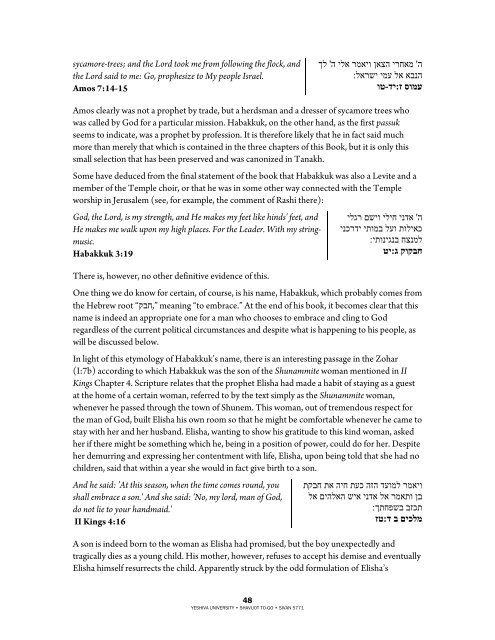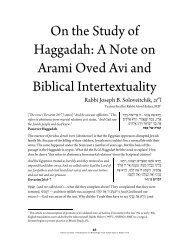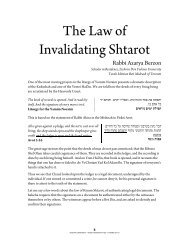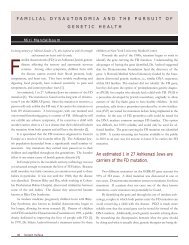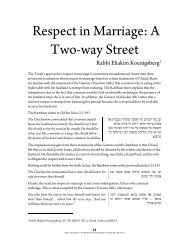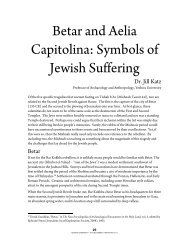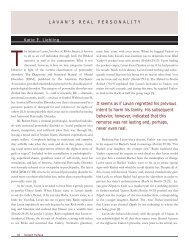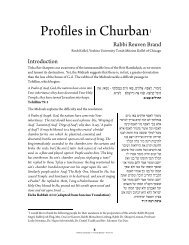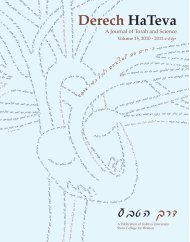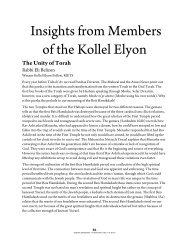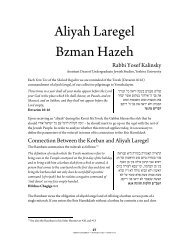You also want an ePaper? Increase the reach of your titles
YUMPU automatically turns print PDFs into web optimized ePapers that Google loves.
sycamore-trees; and the Lord took me from following the flock, and<br />
the Lord said to me: Go, prophesize to My people Israel.<br />
Amos 7:14-15<br />
48<br />
YESHIVA UNIVERSITY • SHAVUOT TO-GO • SIVAN 5771<br />
ךל 'ה<br />
ילא רמאיו ןאצה ירחאמ 'ה<br />
: לארשי ימע לא אבנה<br />
וט-די:<br />
ז סומע<br />
Amos clearly was not a prophet by trade, but a herdsman and a dresser of sycamore trees who<br />
was called by God for a particular mission. Habakkuk, on the other hand, as the first passuk<br />
seems to indicate, was a prophet by profession. It is therefore likely that he in fact said much<br />
more than merely that which is contained in the three chapters of this Book, but it is only this<br />
small selection that has been preserved and was canonized in Tanakh.<br />
Some have deduced from the final statement of the book that Habakkuk was also a Levite and a<br />
member of the Temple choir, or that he was in some other way connected with the Temple<br />
worship in Jerusalem (see, for example, the comment of Rashi there):<br />
God, the Lord, is my strength, and He makes my feet like hinds' feet, and<br />
He makes me walk upon my high places. For the Leader. With my stringmusic.<br />
Habakkuk 3:19<br />
There is, however, no other definitive evidence of this.<br />
ילגר םשיו יליח ינדא 'ה<br />
ינכרדי יתומב לעו תוליאכ<br />
: יתוניגנב חצנמל<br />
טי:<br />
ג קוקבח<br />
One thing we do know for certain, of course, is his name, Habakkuk, which probably comes from<br />
the Hebrew root “קבח,” meaning “to embrace.” At the end of his book, it becomes clear that this<br />
name is indeed an appropriate one for a man who chooses to embrace and cling to God<br />
regardless of the current political circumstances and despite what is happening to his people, as<br />
will be discussed below.<br />
In light of this etymology of Habakkuk’s name, there is an interesting passage in the Zohar<br />
(I:7b) according to which Habakkuk was the son of the Shunammite woman mentioned in II<br />
Kings Chapter 4. Scripture relates that the prophet Elisha had made a habit of staying as a guest<br />
at the home of a certain woman, referred to by the text simply as the Shunammite woman,<br />
whenever he passed through the town of Shunem. This woman, out of tremendous respect for<br />
the man of God, built Elisha his own room so that he might be comfortable whenever he came to<br />
stay with her and her husband. Elisha, wanting to show his gratitude to this kind woman, asked<br />
her if there might be something which he, being in a position of power, could do for her. Despite<br />
her demurring and expressing her contentment with life, Elisha, upon being told that she had no<br />
children, said that within a year she would in fact give birth to a son.<br />
And he said: 'At this season, when the time comes round, you<br />
shall embrace a son.' And she said: 'No, my lord, man of God,<br />
do not lie to your handmaid.'<br />
II Kings 4:16<br />
תקבח תא היח תעכ הזה דעומל רמאיו<br />
לא םיהלאה שיא ינדא לא רמאתו ןב<br />
: ךתחפשב בזכת<br />
זט:<br />
ד ב םיכלמ<br />
A son is indeed born to the woman as Elisha had promised, but the boy unexpectedly and<br />
tragically dies as a young child. His mother, however, refuses to accept his demise and eventually<br />
Elisha himself resurrects the child. Apparently struck by the odd formulation of Elisha’s


